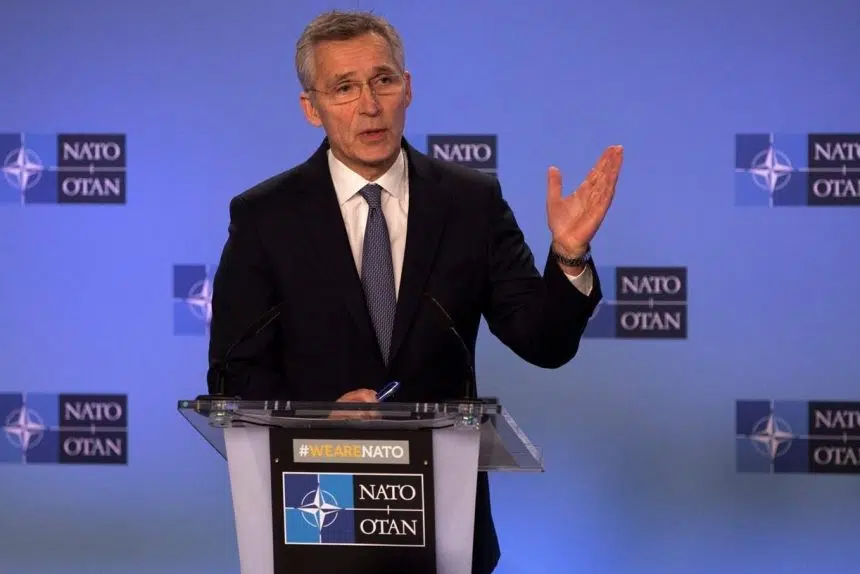OTTAWA – A Canadian-led training mission in Iraq is in limbo after the head of the NATO military alliance indicated Monday there are no plans to shut it down permanently.
NATO Secretary General Jens Stoltenberg instead defended the training mission, which includes 250 Canadian soldiers and is being commanded by a Canadian general, as essential for defeating the Islamic State of Iraq and the Levant.
“We have suspended our training mission now because of the security situation on the ground, but we are ready to restart the training when the situation makes that possible,” Stoltenberg said following a meeting with NATO ambassadors in Brussels.
The training mission was suspended over the weekend due to security concerns following the killing of Iranian Maj.-Gen. Qassem Soleimani by a U.S. drone near the Baghdad airport on Friday night.
Soleimani was the commander of the Quds Force of Iran’s Islamic Revolutionary Guards Corps and was widely considered the second-most powerful leader in Iran after Ayatollah Ali Khamenei. He also had significant influence in Iraq and the surrounding Middle East.
In response to Soleimani’s killing, Iraq’s caretaker prime minister and parliament both called for all U.S. and foreign troops to leave the country while there are fears that Iran or its proxies in the region will launch retaliatory attacks against western forces.
Stoltenberg sidestepped questions about Iraqi demands for the departure of all foreign troops from the country, noting the alliance was there by invitation from the Iraqi authorities, adding: “We will continue to work closely to have close dialogue with the Iraqi government.”
The Canadian government did not offer any clarity on the state of the military mission in a statement about Foreign Affairs Minister Francois-Philippe Champagne having spoken Monday to his Iraqi counterpart, Mohammed Ali al-Hakim.
Champagne reiterated Canada’s support to the fight against ISIL, the statement read, even as both foreign ministers agreed that de-escalation was necessary to ensure Iraq’s long-term security and stability.
“Minister Champagne pledged to continue to work with the government of Iraq to achieve the peace, stability and prosperity that the people of Iraq want and deserve,” the statement added. “Both ministers have agreed to keep in close touch in the coming days and weeks.”
Defence Minister Harjit Sajjan similarly offered few details about a conversation he had with Stoltenberg about the NATO training mission.
“We are committed to a stable Iraq, the fight against (ISIL) and to resume training when the situation allows,” Sajjan wrote on Twitter. “During the temporary pause, our focus is on the safety of those who serve.”
Canada has commanded the NATO training mission since it was created in 2018, with Maj.-Gen. Jennie Carignan having recently taken the helm. The mission was established to train the Iraqi military in the basics of soldiering so they can defend against any ISIL resurgence.
The NATO mission is separate from that of dozens of Canadian special-forces soldiers who have been working with local security forces in northern Iraq’s Kurdistan region since October 2014. Canada also has medical personnel and a helicopter unit in the north.
Their activities have been similarly suspended while the Canadian government waits to see how the situation unfolds. The government has not said what contingency plans it has to withdraw quickly.
Not only did all NATO members voice support for the training mission during Monday’s ambassadors’ meeting, Stoltenberg said, but Iraqi officials themselves stressed its importance when he visited the country in the fall.
“One of the best weapons we have in the fight against international terrorism is to train local forces, build local capacity, and that’s exactly what the coalition is doing and what NATO is doing through our training mission in Iraq,” he said.
Canada first deployed troops to fight ISIL, or Daesh, in 2014 when the extremist group overran large parts of Syria and Iraq. The mission has evolved several times since then as the focus has shifted from beating back ISIL to ensuring it does not have the ability to reconstitute itself.
The Canadian military also has troops in Kuwait, Lebanon and Jordan as part of the anti-ISIL mission.
Yet popular unrest in Iraq over endemic corruption, a lack of government services and Iran’s influence in the country, the mounting tensions between the U.S. and Iran, and the ongoing war in Syria have pulled attention away from the fight against ISIL.
The Iraqi parliament on Sunday approved a resolution calling for all foreign troops to leave the country, which was supported by outgoing Prime Minister Adil Abdul-Mahdi. However, the vote was boycotted by many Sunni and Kurdish parliamentarians and is largely symbolic.
Stoltenberg, meanwhile, took aim at Iran, saying NATO allies were united in condemning its support for different terrorist groups even as he called on it to restrain from any retaliatory action over Soleimani’s death and work toward de-escalation.
“A new conflict would be in no one’s interest,” he said. “So Iran must refrain from further violence and provocations.”
Following Soleimani’s death and a public outpouring of grief in Tehran, the Iranian government on Sunday announced it would no longer abide by a 2015 deal limiting its nuclear program, raising fears it would redouble efforts to build an atomic bomb.
U.S. President Donald Trump, who authorized Soleimani’s killing, responded on Twitter, writing: “Iran will never have a nuclear weapon!”
Lee Berthiaume, The Canadian Press







